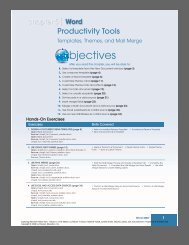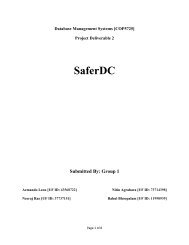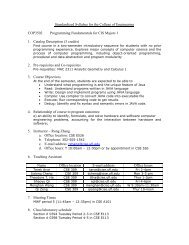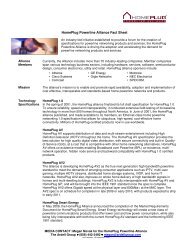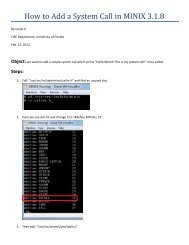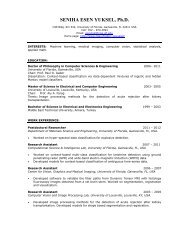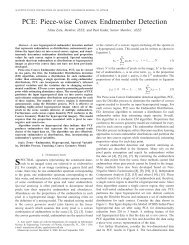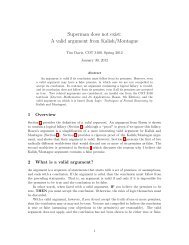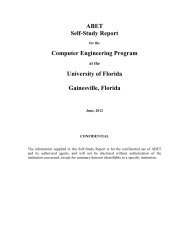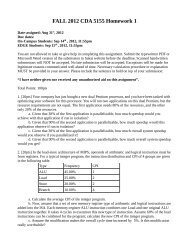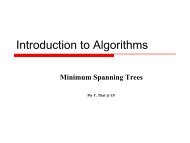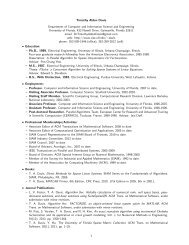- Page 1 and 2:
IST Integrated Project No 026920 Pa
- Page 3 and 4:
4-June-07 P1901_PRO_016_r0 IEEE P19
- Page 5 and 6:
4-June-07 P1901_PRO_016_r0 The prop
- Page 7 and 8:
4-June-07 P1901_PRO_016_r0 1 INTROD
- Page 9 and 10:
4-June-07 P1901_PRO_016_r0 3.8.1 Ch
- Page 11 and 12:
4-June-07 P1901_PRO_016_r0 3.15.17
- Page 13 and 14:
4-June-07 P1901_PRO_016_r0 4.7.4 MA
- Page 15 and 16:
4-June-07 P1901_PRO_016_r0 5.5 LLC
- Page 17 and 18:
4-June-07 P1901_PRO_016_r0 8.2 SERV
- Page 19 and 20:
4-June-07 P1901_PRO_016_r0 11.6 PRO
- Page 21 and 22:
4-June-07 P1901_PRO_016_r0 ANNEX B
- Page 23 and 24:
4-June-07 P1901_PRO_016_r0 ⎣⎦
- Page 25 and 26:
4-June-07 P1901_PRO_016_r0 Multicas
- Page 27 and 28:
4-June-07 P1901_PRO_016_r0 Tonemap
- Page 29 and 30:
4-June-07 P1901_PRO_016_r0 CDP Clus
- Page 31 and 32:
4-June-07 P1901_PRO_016_r0 MIC Mess
- Page 33 and 34:
4-June-07 P1901_PRO_016_r0 TA Token
- Page 35 and 36:
4-June-07 P1901_PRO_016_r0 A BPL ce
- Page 37 and 38: 4-June-07 P1901_PRO_016_r0 2.6 NETW
- Page 39 and 40: 4-June-07 P1901_PRO_016_r0 3.1 OVER
- Page 41 and 42: 4-June-07 P1901_PRO_016_r0 16 12 g
- Page 43 and 44: 4-June-07 P1901_PRO_016_r0 1 2 3 4
- Page 45 and 46: 4-June-07 P1901_PRO_016_r0 0 2 3 8
- Page 47 and 48: 4-June-07 P1901_PRO_016_r0 L is giv
- Page 49 and 50: 4-June-07 P1901_PRO_016_r0 Control
- Page 51 and 52: 4-June-07 P1901_PRO_016_r0 is set t
- Page 53 and 54: 4-June-07 P1901_PRO_016_r0 0 0x2bf
- Page 55 and 56: 4-June-07 P1901_PRO_016_r0 3.5.3 Bi
- Page 57 and 58: 4-June-07 P1901_PRO_016_r0 1 0,0,0,
- Page 59 and 60: 4-June-07 P1901_PRO_016_r0 points p
- Page 61 and 62: 4-June-07 P1901_PRO_016_r0 Frequenc
- Page 63 and 64: 4-June-07 P1901_PRO_016_r0 Several
- Page 65 and 66: 4-June-07 P1901_PRO_016_r0 s SOT (
- Page 67 and 68: 4-June-07 P1901_PRO_016_r0 3.9 CARR
- Page 69 and 70: 4-June-07 P1901_PRO_016_r0 The tran
- Page 71 and 72: 4-June-07 P1901_PRO_016_r0 3.14.2 R
- Page 73 and 74: 4-June-07 P1901_PRO_016_r0 MPDU PHY
- Page 75 and 76: 4-June-07 P1901_PRO_016_r0 3.15.5.2
- Page 77 and 78: 4-June-07 P1901_PRO_016_r0 3.15.9 P
- Page 79 and 80: 4-June-07 P1901_PRO_016_r0 3.15.12.
- Page 81 and 82: 4-June-07 P1901_PRO_016_r0 3.15.16.
- Page 83 and 84: 4-June-07 P1901_PRO_016_r0 3.15.20.
- Page 85 and 86: 4-June-07 P1901_PRO_016_r0 The chan
- Page 87: 4-June-07 P1901_PRO_016_r0 The foll
- Page 91 and 92: 4-June-07 P1901_PRO_016_r0 4.2.2.2
- Page 93 and 94: 4-June-07 P1901_PRO_016_r0 Legend T
- Page 95 and 96: 4-June-07 P1901_PRO_016_r0 MPDU Bur
- Page 97 and 98: 4-June-07 P1901_PRO_016_r0 List Inf
- Page 99 and 100: 4-June-07 P1901_PRO_016_r0 4.3.4 Ch
- Page 101 and 102: 4-June-07 P1901_PRO_016_r0 4.3.4.2
- Page 103 and 104: 4-June-07 P1901_PRO_016_r0 Tokens a
- Page 105 and 106: 4-June-07 P1901_PRO_016_r0 Master T
- Page 107 and 108: 4-June-07 P1901_PRO_016_r0 Tmax Tma
- Page 109 and 110: 4-June-07 P1901_PRO_016_r0 - Channe
- Page 111 and 112: 4-June-07 P1901_PRO_016_r0 It is us
- Page 113 and 114: 4-June-07 P1901_PRO_016_r0 4.4.2 To
- Page 115 and 116: 4-June-07 P1901_PRO_016_r0 ¡Error!
- Page 117 and 118: 4-June-07 P1901_PRO_016_r0 4.4.2.2
- Page 119 and 120: 4-June-07 P1901_PRO_016_r0 7 Reserv
- Page 121 and 122: 4-June-07 P1901_PRO_016_r0 2 � 73
- Page 123 and 124: 4-June-07 P1901_PRO_016_r0 4.4.2.6
- Page 125 and 126: 4-June-07 P1901_PRO_016_r0 - Unused
- Page 127 and 128: 4-June-07 P1901_PRO_016_r0 - Number
- Page 129 and 130: 4-June-07 P1901_PRO_016_r0 mains pe
- Page 131 and 132: 4-June-07 P1901_PRO_016_r0 Figure 5
- Page 133 and 134: 4-June-07 P1901_PRO_016_r0 Figure 5
- Page 135 and 136: 4-June-07 P1901_PRO_016_r0 Channel
- Page 137 and 138: 4-June-07 P1901_PRO_016_r0 4.7.2.3
- Page 139 and 140:
4-June-07 P1901_PRO_016_r0 4.7.6.3
- Page 141 and 142:
4-June-07 P1901_PRO_016_r0 - token:
- Page 143 and 144:
4-June-07 P1901_PRO_016_r0 4.7.14 M
- Page 145 and 146:
4-June-07 P1901_PRO_016_r0 4.7.18 M
- Page 147 and 148:
4-June-07 P1901_PRO_016_r0 4.7.22 M
- Page 149 and 150:
4-June-07 P1901_PRO_016_r0 4.7.25.4
- Page 151 and 152:
4-June-07 P1901_PRO_016_r0 - PAP Co
- Page 153 and 154:
4-June-07 P1901_PRO_016_r0 Port_4 P
- Page 155 and 156:
4-June-07 P1901_PRO_016_r0 7 PAP In
- Page 157 and 158:
4-June-07 P1901_PRO_016_r0 Packet f
- Page 159 and 160:
4-June-07 P1901_PRO_016_r0 5.4 Pack
- Page 161 and 162:
4-June-07 P1901_PRO_016_r0 PAP Info
- Page 163 and 164:
4-June-07 P1901_PRO_016_r0 5.4.2.3
- Page 165 and 166:
4-June-07 P1901_PRO_016_r0 8 6 14 G
- Page 167 and 168:
4-June-07 P1901_PRO_016_r0 5.5.3.3
- Page 169 and 170:
4-June-07 P1901_PRO_016_r0 The Pack
- Page 171 and 172:
4-June-07 P1901_PRO_016_r0 If PCF i
- Page 173 and 174:
4-June-07 P1901_PRO_016_r0 bits 7 6
- Page 175 and 176:
4-June-07 P1901_PRO_016_r0 port usi
- Page 177 and 178:
4-June-07 P1901_PRO_016_r0 a) Frame
- Page 179 and 180:
4-June-07 P1901_PRO_016_r0 b) In th
- Page 181 and 182:
4-June-07 P1901_PRO_016_r0 The FMN
- Page 183 and 184:
4-June-07 P1901_PRO_016_r0 8.2.4 Se
- Page 185 and 186:
4-June-07 P1901_PRO_016_r0 Service
- Page 187 and 188:
4-June-07 P1901_PRO_016_r0 8.5 Traf
- Page 189 and 190:
4-June-07 P1901_PRO_016_r0 SSAP 1 b
- Page 191 and 192:
4-June-07 P1901_PRO_016_r0 0x07 Par
- Page 193 and 194:
4-June-07 P1901_PRO_016_r0 bits 7 6
- Page 195 and 196:
4-June-07 P1901_PRO_016_r0 The ABLP
- Page 197 and 198:
4-June-07 P1901_PRO_016_r0 i) CRC:
- Page 199 and 200:
4-June-07 P1901_PRO_016_r0 c) Local
- Page 201 and 202:
4-June-07 P1901_PRO_016_r0 ACCESS_T
- Page 203 and 204:
4-June-07 P1901_PRO_016_r0 ACCESS_T
- Page 205 and 206:
4-June-07 P1901_PRO_016_r0 The tran
- Page 207 and 208:
4-June-07 P1901_PRO_016_r0 12 12 9
- Page 209 and 210:
4-June-07 P1901_PRO_016_r0 Figure 8
- Page 211 and 212:
4-June-07 P1901_PRO_016_r0 multicas
- Page 213 and 214:
4-June-07 P1901_PRO_016_r0 In the c
- Page 215 and 216:
4-June-07 P1901_PRO_016_r0 Destinat
- Page 217 and 218:
4-June-07 P1901_PRO_016_r0 9.1.4.3.
- Page 219 and 220:
4-June-07 P1901_PRO_016_r0 AnM from
- Page 221 and 222:
4-June-07 P1901_PRO_016_r0 However,
- Page 223 and 224:
4-June-07 P1901_PRO_016_r0 capabili
- Page 225 and 226:
4-June-07 P1901_PRO_016_r0 An index
- Page 227 and 228:
4-June-07 P1901_PRO_016_r0 determin
- Page 229 and 230:
4-June-07 P1901_PRO_016_r0 Field Na
- Page 231 and 232:
4-June-07 P1901_PRO_016_r0 LMAC_ACK
- Page 233 and 234:
4-June-07 P1901_PRO_016_r0 1 byte F
- Page 235 and 236:
4-June-07 P1901_PRO_016_r0 Index Fi
- Page 237 and 238:
4-June-07 P1901_PRO_016_r0 decoding
- Page 239 and 240:
4-June-07 P1901_PRO_016_r0 MAX_CAP_
- Page 241 and 242:
4-June-07 P1901_PRO_016_r0 Figure 1
- Page 243 and 244:
4-June-07 P1901_PRO_016_r0 Figure 1
- Page 245 and 246:
4-June-07 P1901_PRO_016_r0 Figure 1
- Page 247 and 248:
4-June-07 P1901_PRO_016_r0 The runn
- Page 249 and 250:
4-June-07 P1901_PRO_016_r0 Figure 1
- Page 251 and 252:
4-June-07 P1901_PRO_016_r0 capabili
- Page 253 and 254:
4-June-07 P1901_PRO_016_r0 Table 39
- Page 255 and 256:
4-June-07 P1901_PRO_016_r0 A node t
- Page 257 and 258:
4-June-07 P1901_PRO_016_r0 The CAC_
- Page 259 and 260:
4-June-07 P1901_PRO_016_r0 CAC_Chg
- Page 261 and 262:
4-June-07 P1901_PRO_016_r0 Bytes CA
- Page 263 and 264:
4-June-07 P1901_PRO_016_r0 Table 50
- Page 265 and 266:
4-June-07 P1901_PRO_016_r0 Figure 1
- Page 267 and 268:
4-June-07 P1901_PRO_016_r0 MAX_CAC_
- Page 269 and 270:
4-June-07 P1901_PRO_016_r0 CPE TDR
- Page 271 and 272:
4-June-07 P1901_PRO_016_r0 CPE TDR
- Page 273 and 274:
4-June-07 P1901_PRO_016_r0 The rule
- Page 275 and 276:
4-June-07 P1901_PRO_016_r0 Table 53
- Page 277 and 278:
4-June-07 P1901_PRO_016_r0 Figure 1
- Page 279 and 280:
4-June-07 P1901_PRO_016_r0 STP pack
- Page 281 and 282:
4-June-07 P1901_PRO_016_r0 Point-to
- Page 283 and 284:
4-June-07 P1901_PRO_016_r0 The Cryp
- Page 285 and 286:
4-June-07 P1901_PRO_016_r0 The Nonc
- Page 287 and 288:
4-June-07 P1901_PRO_016_r0 Table 58
- Page 289 and 290:
4-June-07 P1901_PRO_016_r0 In IEEE
- Page 291 and 292:
4-June-07 P1901_PRO_016_r0 The form
- Page 293 and 294:
4-June-07 P1901_PRO_016_r0 Attribut
- Page 295 and 296:
4-June-07 P1901_PRO_016_r0 - EAPOL-
- Page 297 and 298:
4-June-07 P1901_PRO_016_r0 SNMP: no
- Page 299 and 300:
4-June-07 P1901_PRO_016_r0 • GENE
- Page 301 and 302:
4-June-07 P1901_PRO_016_r0 o Parame
- Page 303 and 304:
4-June-07 P1901_PRO_016_r0 o Mandat
- Page 305 and 306:
4-June-07 P1901_PRO_016_r0 Enables
- Page 307 and 308:
4-June-07 P1901_PRO_016_r0 • PROF
- Page 309 and 310:
4-June-07 P1901_PRO_016_r0 With thi
- Page 311 and 312:
4-June-07 P1901_PRO_016_r0 11.7 TRA
- Page 313 and 314:
4-June-07 P1901_PRO_016_r0 o Parame
- Page 315 and 316:
4-June-07 P1901_PRO_016_r0 o Mandat
- Page 317 and 318:
4-June-07 P1901_PRO_016_r0 Selects
- Page 319 and 320:
4-June-07 P1901_PRO_016_r0 o SNMP:
- Page 321 and 322:
4-June-07 P1901_PRO_016_r0 • VOIP
- Page 323 and 324:
4-June-07 P1901_PRO_016_r0 o Parame
- Page 325 and 326:
4-June-07 P1901_PRO_016_r0 Timer ::
- Page 327 and 328:
4-June-07 P1901_PRO_016_r0 RINGBACK
- Page 329 and 330:
4-June-07 P1901_PRO_016_r0 11.12.3
- Page 331 and 332:
4-June-07 P1901_PRO_016_r0 • VLAN
- Page 333 and 334:
4-June-07 P1901_PRO_016_r0 o SNMP:
- Page 335 and 336:
4-June-07 P1901_PRO_016_r0 o Parame
- Page 337 and 338:
4-June-07 P1901_PRO_016_r0 • VLAN
- Page 339 and 340:
4-June-07 P1901_PRO_016_r0 o SNMP:
- Page 341 and 342:
4-June-07 P1901_PRO_016_r0 This aut
- Page 343 and 344:
4-June-07 P1901_PRO_016_r0 This par
- Page 345 and 346:
4-June-07 P1901_PRO_016_r0 o Parame
- Page 347 and 348:
4-June-07 P1901_PRO_016_r0 All mana
- Page 349 and 350:
4-June-07 P1901_PRO_016_r0 plSystem
- Page 351 and 352:
4-June-07 P1901_PRO_016_r0 o plSysC
- Page 353 and 354:
4-June-07 P1901_PRO_016_r0 plBasic
- Page 355 and 356:
4-June-07 P1901_PRO_016_r0 plPhy Fi
- Page 357 and 358:
4-June-07 P1901_PRO_016_r0 plQoS
- Page 359 and 360:
4-June-07 P1901_PRO_016_r0 o plStat
- Page 361 and 362:
4-June-07 P1901_PRO_016_r0 1. Every
- Page 363 and 364:
4-June-07 P1901_PRO_016_r0 • TD R
- Page 365 and 366:
4-June-07 P1901_PRO_016_r0 1. The c
- Page 367 and 368:
4-June-07 P1901_PRO_016_r0 If the i
- Page 369 and 370:
4-June-07 P1901_PRO_016_r0 DATA Tim
- Page 371 and 372:
4-June-07 P1901_PRO_016_r0 Figure 1
- Page 373 and 374:
4-June-07 P1901_PRO_016_r0 • Step
- Page 375 and 376:
4-June-07 P1901_PRO_016_r0 Internet
- Page 377 and 378:
4-June-07 P1901_PRO_016_r0 12.2.7.6
- Page 379 and 380:
4-June-07 P1901_PRO_016_r0 • MAC
- Page 381 and 382:
4-June-07 P1901_PRO_016_r0 • GENE
- Page 383 and 384:
4-June-07 P1901_PRO_016_r0 o Parame
- Page 385 and 386:
4-June-07 P1901_PRO_016_r0 o Parame
- Page 387 and 388:
4-June-07 P1901_PRO_016_r0 o Parame
- Page 389 and 390:
4-June-07 P1901_PRO_016_r0 o KEYPAD
- Page 391 and 392:
4-June-07 P1901_PRO_016_r0 • VOIP
- Page 393 and 394:
4-June-07 P1901_PRO_016_r0 o Parame
- Page 395 and 396:
4-June-07 P1901_PRO_016_r0 o Parame
- Page 397 and 398:
4-June-07 P1901_PRO_016_r0 -- Objec
- Page 399 and 400:
4-June-07 P1901_PRO_016_r0 plSysCar
- Page 401 and 402:
4-June-07 P1901_PRO_016_r0 ACCESS r
- Page 403 and 404:
4-June-07 P1901_PRO_016_r0 SYNTAX I
- Page 405 and 406:
4-June-07 P1901_PRO_016_r0 plBasicE
- Page 407 and 408:
4-June-07 P1901_PRO_016_r0 STATUS c
- Page 409 and 410:
4-June-07 P1901_PRO_016_r0 -- STATU
- Page 411 and 412:
4-June-07 P1901_PRO_016_r0 DESCRIPT
- Page 413 and 414:
4-June-07 P1901_PRO_016_r0 plPhyByM
- Page 415 and 416:
4-June-07 P1901_PRO_016_r0 ::= { pl
- Page 417 and 418:
4-June-07 P1901_PRO_016_r0 ::= { pl
- Page 419 and 420:
4-June-07 P1901_PRO_016_r0 plMACCon
- Page 421 and 422:
4-June-07 P1901_PRO_016_r0 -- ACCES
- Page 423 and 424:
4-June-07 P1901_PRO_016_r0 plQoSPri
- Page 425 and 426:
4-June-07 P1901_PRO_016_r0 plQoSPer
- Page 427 and 428:
4-June-07 P1901_PRO_016_r0 -- The p
- Page 429 and 430:
4-June-07 P1901_PRO_016_r0 plStatis
- Page 431 and 432:
4-June-07 P1901_PRO_016_r0 ACCESS r
- Page 433 and 434:
4-June-07 P1901_PRO_016_r0 ::= { pl
- Page 435 and 436:
4-June-07 P1901_PRO_016_r0 DESCRIPT
- Page 437 and 438:
4-June-07 P1901_PRO_016_r0 INDEX {
- Page 439 and 440:
4-June-07 P1901_PRO_016_r0 plStpCar
- Page 441 and 442:
4-June-07 P1901_PRO_016_r0 MAX-ACCE
- Page 443 and 444:
4-June-07 P1901_PRO_016_r0 END STAT
- Page 445 and 446:
S mode 0 S mode 1 S mode 2 S mode 3
- Page 447:
EC/IST FP6 Project No 026920 Work P



